This is the 400th post on this blog.
And, what with my penchant for honouring precedents, I couldn’t pass up this opportunity to watch a film that has that number—400—in its title. Les Quatre Cents Coups (known in English as The Four Hundred Blows, though the actual translation would be closer to ‘the four hundred dirty tricks’) was directed by François Truffaut, one of the most prominent pioneers of French New Wave cinema. It was Truffaut’s first full-length feature film, a work that not only won much critical acclaim, but also led Truffaut to make a series of sequels featuring the same lead character…
…who is, in Les Quatre Cents Coups, the twelve-year old Antoine Doinel (Jean-Pierre Léaud).
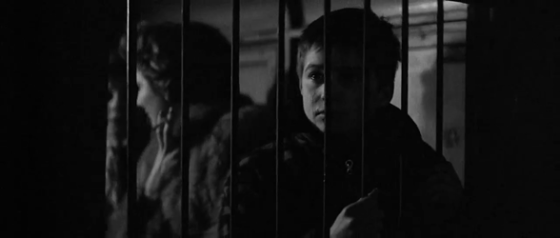
Much of the first half of the film is set in the school where Antoine studies, and this is where we are introduced to our protagonist. A teacher—dubbed ‘Sourpuss’ by Antoine and his classmates—is conducting an exam. His students are busy finishing off their papers, and some of them have found the time to simultaneously amuse themselves. A picture of a pin-up girl is making its way from one desk to another, from one pair of admiring hands to another.
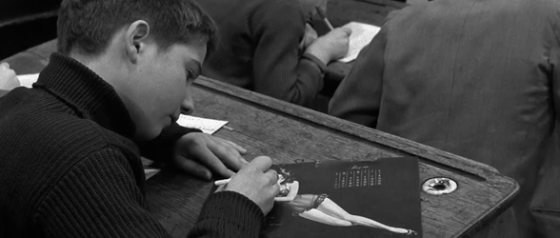
Sourpuss discovers the picture when Antoine—who’s added a few touches to the lady’s hairdo—is passing it on to his neighbour. Antoine gets called forward, and is relegated to standing behind the blackboard, in the corner.
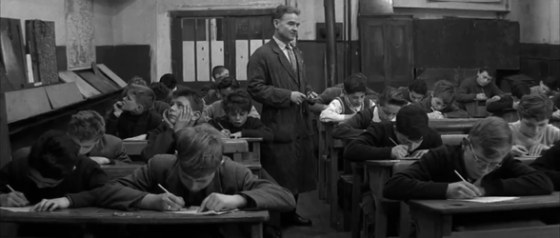
This turns out to be a precursor of things to come.
Antoine was not the one who initiated the escapade. Antoine was not the one to bring the pin-up to class. He was not the only one to look at the picture. But he was the one who got caught, and that is why (figuratively speaking) Antoine must hang. Through the rest of the film, we watch as Antoine, not always completely innocent but also not always the sole guilty party, ends up getting into trouble.
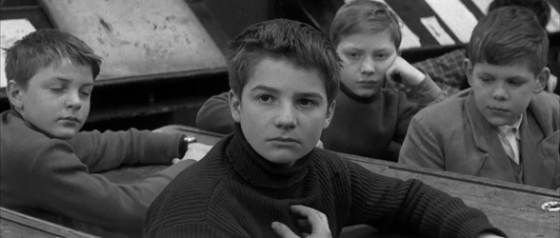
There is (and there’s no ‘perhaps’ about this) his home life to blame for Antoine’s less-than-exemplary conduct in the classroom.
When school finishes, Antoine trails home, accompanied by his loyal friend and partner in crime, René (Patrick Auffay). Antoine is grouchy, naturally, about Sourpuss’s sourness. René tries to comfort him, and by the time they part ways and Antoine heads home, he certainly seems to be a little less annoyed.
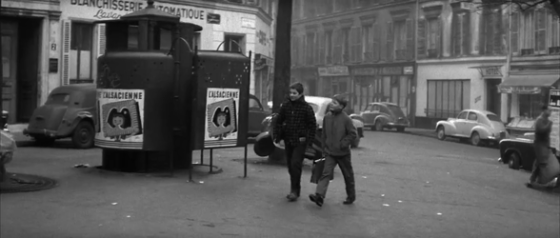
Home for the Doinels is a small, pokey little place. It’s so tiny that Antoine’s bed is tucked away in a tiny back passage that leads onto the stairs. The room—if it can be called that—is so cramped that, to go out the back door, Antoine has to step over the corner of his bed: the door can’t open fully.
There is, we see, nobody at home. Antoine fills coal in a heater, wipes his sooty hands on a curtain, and takes some money from a drawer. He then wanders about, sitting down briefly at a dressing table, toying with cosmetics, dabbing himself with perfume. A lonely boy.
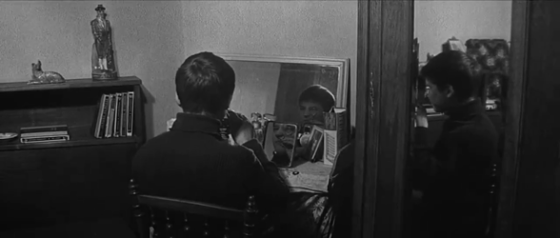
He finally goes and lays the table, setting out crockery and cutlery, before sitting down and opening his school satchel. He looks as if he’s about to begin homework, when there’s an interruption—his mother (Claire Maurier) has come home from work. Antoine is suddenly inundated with a flurry of irritated questions and orders. Get me my slippers. I’d given you money to buy things on your way home; did you buy the flour? No? Go and buy it right now, I need it. Mama treats Antoine rather like a glorified slave.

Papa, Julien Doinel (Albert Rémy) is a little better. We are introduced to him on Antoine’s way back from the shop where he goes to buy the flour; Papa is headed back from office when he runs into Antoine, and father and son come home together. Julien Doinel doesn’t scream and snap at Antoine, so is perhaps the lesser of two evils. He’s playful too, dipping his finger in the flour and tweaking Antoine’s nose with it.
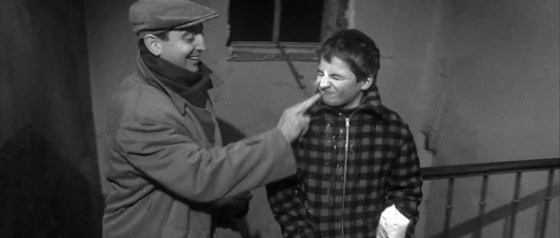
Later, on an occasion when Mama is going to be working late [and, what, pray, makes her work such late hours?], Papa makes dinner (fried eggs) for himself and Antoine. He jokes with Antoine, indulges in some horseplay now and then.
But even this camaraderie is superficial. It is as if Julien Doinel does not really think of Antoine as anything more than a child to be occasionally humoured. He can crack jokes to make Antoine laugh, but that’s it.
Will Papa go out of his way to sit with Antoine and talk to him of life? Will he want to know what Antoine wants to be when he grows up? Will he ask how school is, what Antoine is learning?
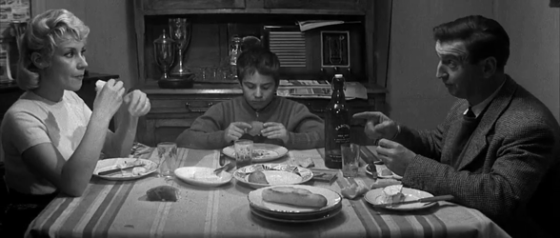
And that is where Antoine is running into all sorts of trouble. It’s not as if Antoine detests school; he is really just another somewhat rebellious boy, whose liking for knowledge sees ups and downs. [There is, for instance, a scene where Antoine, all alone at home, is reading Balzac. He’s so deeply moved that he tears out the writer’s portrait from the book, goes and pins it up in the little family shrine, and lights a candle before it. That this leads to a small fire breaking out and Antoine getting it in the neck from his parents is just another example of Antoine’s good intentions gone awry].
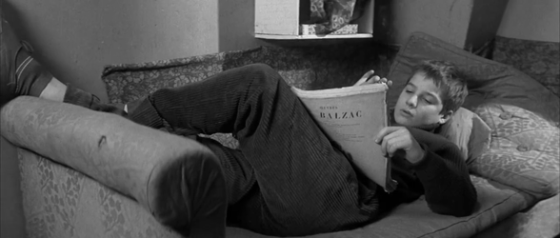
Antoine, however, can also be singularly unenthusiastic about studies (what do you expect, when your own mother says, “Yes, I know. Even I dropped out after high school. And your father never finished. And, anyway, they teach so much that you’ll never use in real life. Like algebra. Science. What’s the point of it?”)
So, with his mate René, Antoine plays truant from school. They run off, spending an entire day roaming around, going to a fair, watching a film, chatting…
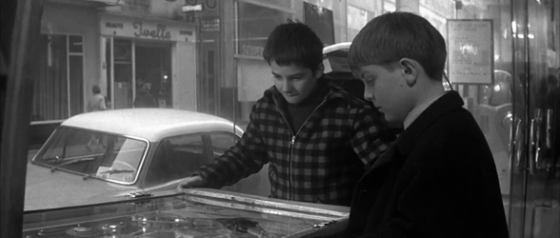
…and Antoine happens to see his mother, standing on a pavement, passionately kissing another man. And his mother sees him.
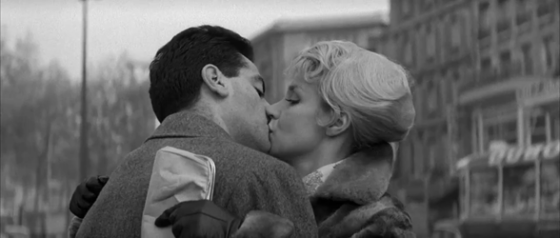
This, therefore, is the story of Antoine’s life. Parents who couldn’t really be bothered about him (which begs the question: why bring a child into the world, then?—a question millions should ask themselves). Parents who are too busy leading their own lives (Mama, with her illicit lover, Papa with his racing club, to which he is devoted) to care about what happens to Antoine.
And what does happen to Antoine?
I have to admit to a deep and abiding love for well-made films (or well-written stories) that look closely at children. Not children in the highly stylized, melodramatic or syrupy way of the Shirley Temples and Daisy Iranis of the early years, but children the way children really are. More perceptive, more sensitive, wiser than a lot of adults tend to think them. Children of films like Les Quatre Cents Coups.
Watch this film not for a story (though there is a good story here, a heartbreaking and poignant but eventually also hopeful tale), but for Antoine Doinel. Antoine, as he laughs with sheer joy when he gets dizzy in a fast-rotating giant drum at the fair. Antoine, as he lies in bed and overhears his parents quarrelling, his mother saying (about Antoine): “He lies through his teeth!” and (just a few seconds later): “Fine! We’ll send him to the Jesuits, or to the Army orphans.”

Antoine, the beleaguered. Antoine, the rebel. Antoine, who sneaks cigarettes and tobacco, who runs away from school and home, who takes to petty theft. Antoine, who is caught somewhere in that uncomfortable space between the innocence of childhood and the worldly-wise cynicism of adulthood. Antoine, who’s growing up, thanks to his parents, before his time.
What I liked about this film:
The characterization (by Truffaut and Marcel Moussy), the direction (Truffaut) and the cinematography (by Henri Decaë).
I know that sounds like a lot to lump into one category, but I found myself appreciating, at many instances during the film, the combination of these three. For example, the scene where Antoine is lying in his cramped little bed and listening to his parents yelling at each other: a powerful scene, made all the more so because the parents aren’t shown. We can hear their voices in the background, but we see only Antoine. The flicker of pain in his face as he hears the harsh words his mother uses for him, the anguish. There are no tears, no howling, just a subtle and understated reinforcement of Antoine’s realization (or re-realization; he is no fool) that he is unwanted.
Then there are the amazing little frames that say so much without saying anything. René, come to visit Antoine at a juvenile detention home, rides away on his bicycle, whistling. Carefree, and free.
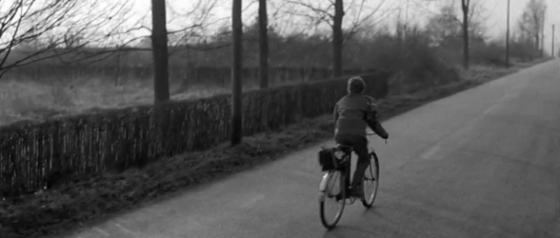
Or, also at the detention home, an escaped delinquent who has been recaptured is taken away into solitary confinement. Led by two guards, down a long, lonely path, between regimented rows of trees which suggest prison bars…
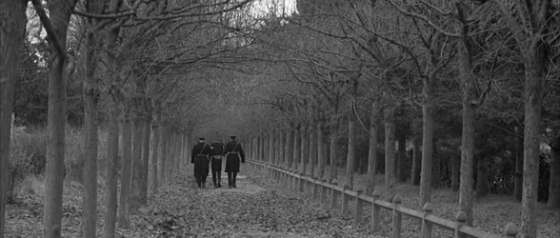
Or (and this was a scene that really mesmerized me), children watching a puppet show. Antoine and René, bunking school, are sitting at the back and chatting. They are the older children, the ones who aren’t paying attention to the puppets. The ones in front—the toddlers, the younger children—are the ones on whom Truffaut focusses, and they’re utterly captivating, because this is so very unstaged.
There’s curiosity, laughter, fear, even almost-tears on these little faces as they watch the puppet show (I’m guessing Truffaut used an actual show and managed to sneak a candid camera in somewhere; these children are certainly not acting).
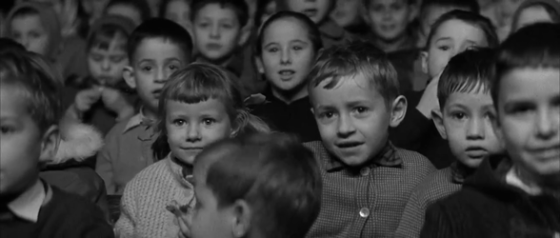
An interesting contrast to the two older boys, who are too caught up in their own lives, their own worries, to even think of what’s happening onstage.
I love, also, the little details that show Antoine’s life as a child. He may be slipping into a life of petty crime and drifting away from the straight and narrow, but Antoine is still a child, taking delight in such small things as getting dizzy in a rotating drum, shooting arrows from a gable, or calling out “Bon jour, madame!” to a priest passing by with his cassock swirling around his ankles.
Jean-Pierre Léaud in his debut role as Antoine Doinel. He is excellent, a very fine actor for someone who was just fourteen when Les Quatre Cents Coups was made. (Here, by the way, is Léaud’s audition for the film: it’s a short clip, and worth a watch).
What I didn’t like:
I’ll pass this up. There are few films about which I can say that I liked everything, and this was one of them. It’s a gripping, very touching film, and superbly made: sad, witty, and poignant, all at the same time.
Les Quatre Cents Coups was a semi-autobiographical film for Truffaut, and the depth of feeling that is imbued in the story and its treatment makes it memorable. Do watch.

Congrats Madhulika! It is a long read but the pictures are great! More power to your pen!
LikeLike
Thank you so much, Julia! :-)
LikeLike
Congratulations, dear Madhu!
Here is to the next 400 posts!
The film sounds so promising. Will come and read at leisure. Have work on hands.
*hugs*
LikeLike
You’re a gem, Harvey! Thank you so much. *hugs back*
Hope your work isn’t dragging you down too much.
LikeLike
Congratulations Madhu!!!
400 gems that we have enjoyed. :-)
Love the review of this film. It seems very good and well made judging from what you’ve written. Somehow I can’t bring myself to watch films showing suffering of children, where a child is left feeling unwanted by selfish parents. Give me a film with a sacrificing mother/father anyday.
Looking forward to more of your excellent 400+ posts :-)
LikeLike
Thank you, pacifist! I am very grateful for the affection and appreciation of all my readers – and very specially for people like you, who come along and read and comment on just about everything I write. You can’t imagine how much that encourages me. (Whether or not that encouragement is a good idea is something I won’t venture into! LOL).
Yes, suffering children is not my cup of tea either. I remember watching a Chinese film – I think it was called Bubbling Spring or something like that, back in the early 80s. It was about a group of orphans who are being turned out of the foster home they live in, because the old lady who’s their foster mother is victimised. Something like that. It was so sad, I remember my mum, my sister, and me sitting and crying our eyes out.
Les Quatre Cents Coups is not quite such a tear-jerker (possibly because Antoine is older, and somewhat street-savvy), but yes, the sadness does surface now and then. Actually, come to think of it, the sadness is accentuated because it tends to get hidden behind Antoine’s antics. :-(
LikeLike
Aaaarghhh! I had planned to review this. :( (But since I have been sitting on the draft for almost a year, I don’t have a leg to stand on while complaining! *grin*)
Lovely review, Madhu, and I agree with you that there is nothing to not like in this film. But it is not a film I could watch often, it is too sad.
Congratulations on your 400 posts milestone – let there be many more! :)
LikeLike
Anu I don’t think there is a law against two bloggers reviewing the same film HA HA!!, what do you say Madhu? It would be nice to read Anu’s take on the film too. I have often read different reviews in different newspapers of the same film and it is quite interesting to see how different people react to the same film.—- Shilpi
LikeLike
I second that. Anu, do write this up.
LikeLike
I agree, Anu. I don’t think I’ll rewatch this film for a few years yet. It’s superb, but it’s too sad. Rather like Lladri di Biciclette or La Tia Tula, really – great films, but too emotionally draining to merit frequent rewatches.
Oh, and please – do, do review this! I would love to read what you have to say about it.
LikeLike
Adding my ‘might’ behind the others, Anu :-)
LikeLike
So many people asking you to review it, Anu. Please, please! :-)
LikeLike
I’m flattered. *grin* Thanks, folks! Yes, I think I will, though I’ll wait a while. Insanely busy, for one thing, and two, having just read your wonderful review, I am sure to be influenced by it. As it is, we often use the same turn of phrase. At this point, my review would probably mirror yours! :)
LikeLike
Whenever! But we’ll hold you to that promise. :-)
LikeLike
Another great film if you can get your hands on it: Le Grand Chemin.
LikeLike
Have just had a look at the IMDB page for it, Anu. It sounds very good. Thank you for the recommendation – I’ll keep an eye out for it!
By the way, have you seen Central do Brasil? Also a very beautiful, poignant film about a child – and his friendship with a woman who takes him under her wing. A Brazilian friend of mine gifted it to me, and I loved it. Also sad, but lovely.
http://www.imdb.com/title/tt0140888/
LikeLike
It’s a wonderful film, Madhu, and even though the background is bleak, it is one of the most uplifting films I have seen.
LikeLike
“even though the background is bleak, it is one of the most uplifting films I have seen.”
That sounds right up my street!
LikeLike
Congratulations on your 400th post! Nice synopsis of a film which deals with a child’s psyche and present his view towards the things which happen around him! Now i need to watch the film :)
LikeLike
Thank you so much, coolone160! :-)
Yes, this is a wonderful film. It isn’t too difficult to get hold of – the English-subbed version I have is from the Criterion Collection
LikeLike
Was very moved by your review!
Thanks!
I can’t say more. Maybe later…
LikeLike
Thank you, Harvey! (and, you’ve left me a little puzzled. Busy? Or don’t know what to say? Whatever. :-))
LikeLike
Congratulations Madhu on your 400th post and you did choose a wonderful film to mark that occasion. I am quite partial to films which have a story, nowadays where do we find a film with a good story. A story with sets you thinking or dialogues which strike an answering chord in your heart. Those days are long gone, Life of Pi for me was an exception I just loved that film’s story and dialogues.— Shilpi
LikeLike
Shilpi, thanks a lot! When I realised my 400th post was coming up, I did think I’d review a really good film, but couldn’t decide on which one to watch. I thought of one (a Hollywood film), then scrapped it, watched another (also Hollywood, but made by a European film maker), and finally decided this one merited a watch and review.
I have to admit I still haven’t got around to watching Life of Pi. And for a rather strange reason. I was quite busy when it was released, and by the time I got time to watch it, that horrible incident of that gang rape in Delhi had occurred. The poor girl had been returning from watching Life of Pi, and somehow now I always associate the film with that. It’s like Ship of Theseus – my brother-in-law’s brother had gone to watch it, slipped and fell in the theatre, and shattered his shoulder.
No valid reason to not watch a film, but there. I can’t help it.
LikeLike
I understand the feeling, one just begins to shudder when one associates something with an unpleasant event.
LikeLike
This sounds utterly lovely. Maybe one of these days, I’ll work up the courage to watch it! I am with Pacifist on children getting a raw deal – give me self-sacrificing parents any day. The tiny segment on Apu’s abandoned son in Ray’s Apur Sansar had me in a flood of tears and this would be even more poignant. Thats the problem with good movies, their characters are so real and their troubles so heartrending.
Congrats on the 400th post! Here’s hoping you delve more into films like these…
LikeLike
“Thats the problem with good movies, their characters are so real and their troubles so heartrending.”
So very true! That’s one reason why films like Bhai-Bahen, despite all the sad songs picturised on Daisy Irani, don’t really move me – because they don’t seem at all real. Les Quatre Cents Coups was so gritty, so easy to relate to, that it made me really feel for Antoine. Despite the fact that Antoine takes to crime (petty, but still crime), or that he’s not anything like I was when I was his age… which is what good storytelling (or film-making) is all about, isn’t it? Being able to make an audience empathise with a character they may not even identify with. Do put this on your list, bollyviewer. It may sadden you, but I think you’ll like it, too.
P.S. And, thank you! ;-)
LikeLike
Congratulations Madhu for 400 wonderful posts and another 1000 and much more are expected from you
Iam thankful to you for introducing us to world cinema specially European cinema.
Hither to we know and watch only Hollywood movies.
Thank you and may God bless you
LikeLike
Epstein, you touched my heart with your comment. Thank you so very much.
LikeLike
Madhu,
Congratulations on your blogging milestone, and a beautiful review. I see Anu was also contemplating to write its review. I would urge her to do it. Both of you surpass a great movie by your lyrical reviews. This is now added in my must-watch films.
Your review reminds me of Fellini’s Amarcord, at least the child’s innocence and his playful world, and the beautiful surroundings, though the Fellini’s child – again semi-autobiographical – is somewhat older. If you have not reviewed it, I would urge you to do it. The loveless family part reminded me of Fanny And Alexander, though in a very different way.
There was a time when I got great opportunity to watch European films. I loved them, for their abstraction, and can you believe it, the English sub-tiles. I do not know how accurate they were, and there could be difficulty in translation, but that was one more charm for me.
I would love to see you do more European films than Bolywood!
AK
LikeLike
AK, thank you so much. I must admit I didn’t really start watching non-Indian or non-Hollywood films till a few years back (barring the occasional foreign film shown on Doordarshan back in the 80s and 90s, when I used to watch just about everything shown on TV). A few years back, though, spurred on by a cousin, a few blog readers, and some bloggers whose posts I follow, I decided to start watching foreign films. I’ve come across some real gems, and I’m extremely grateful to everybody who’s recommended these to me, all the way from I Soliti Ignoti to Tengoku to Jigoku. Not just European, but cinema from across the world.
Though I’ve heard of both Amarcord and Fanny and Alexander, I haven’t watched either of them yet. Thanks for the recommendation – I’ll certainly look out for them.
And I’m so glad you’d like to read more reviews of world cinema! I always hesitate a bit before reviewing a foreign film, because I know the number of readers will take a hit.
LikeLike
What a blow! 400. :) Loved the review. Truffaut is on the top of my list of favourite directors, so I really enjoyed this. And the audition tape is fun too.
LikeLike
Thank you, Banno! This was a superb film, so beautifully nuanced and good, even if sad (and, much as I would like it to be otherwise, I have to confess that some of the best works are based in sorrow…).
LikeLike
The English title is a straight translation of the French but misses its meaning, as the French title refers to the expression “faire les quatre cents coups”, which means “to raise hell”. On the first American prints, subtitler and dubber Noelle Gilmore gave the film the title Wild Oats, but the distributor did not like that title and reverted it to The 400 Blows, which led some to think the film covered the topic of corporal punishment.
LikeLike